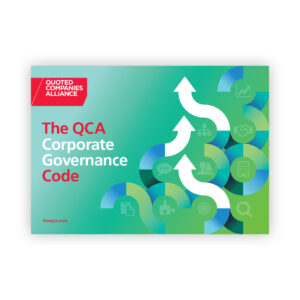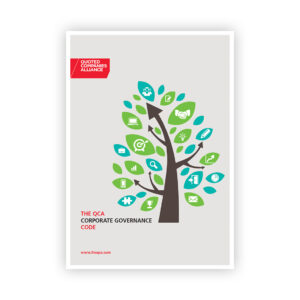Make your voice heard and join the only organisation that champions the interests of small and mid-sized quoted companies. We bring small and mid-caps together to build one voice to create an environment where they can grow and create sustainable long-term benefits for investors and wider society.
Become a QCA Member
Amplify your voice on key issues; connect with peers in your community; take advantage of discounts on a range of services; attend exclusive events. We are the only organisation that champions the value of well-functioning public markets and the entrepreneurial small and mid-sized quoted companies that use them.
Become a Member
Corporate
This membership option is for public companies quoted on the Main Market, AIM or the Aquis Stock Exchange, or companies preparing to join a market.
Adviser
This membership option is for firms that support quoted companies, including brokers, lawyers, corporate finance advisors, institutional investors, accountants, registrars, public relations firms, headhunters, consultants and other professional services.
The companies at the heart of our community
This membership option is for quoted companies or companies looking to join a market in the future.
- Enjoy unparalleled access to institutional investors, regulators, senior politicians, corporate peers and the media through our lunches, workshops, webinars and events.
- Influence our policy responses and campaign stances to improve public market conditions, cut the cost of doing business and boost liquidity.
- Stay informed with our boardroom good practice guides, sector surveys, in-depth research and monthly newsletter.
- Take advantage of exclusive member discounts on partner-run courses, professional services and technology tools.
The vital support network enabling growth and investment
This membership option is for firms that deliver professional services to quoted companies, including lawyers, corporate finance advisors, brokers, institutional investors, accountants, registrars and investor relations services.
- Enjoy unparalleled business development and thought leadership opportunities as part of our thriving corporate network.
- Benefit from access to regulators, policymakers and opinion formers through our lunches, workshops, webinars and events.
- Influence our policy responses and campaign stances to improve public market conditions, cut the cost of doing business and boost liquidity by becoming an active member of one of our seven Expert Groups.
- Stay informed with our boardroom good practice guides, sector surveys, in-depth research and monthly newsletter.
QCA membership benefits include:
Access to investors
- The opportunity to attend our unique flagship Fund Manager Programme, free of charge. These lunches and breakfasts provide you with intimate access to leading small and mid-cap investors, which will help you promote your company and better understand their key criteria in making investment decisions.
Campaigning on key policy and regulatory issues
- Input into our campaigns to ensure that issues important to you are dealt with.
- Join one of our seven Expert Groups, which campaign on key issues affecting quoted companies through meetings, webinars and consultation responses.
- Get access to regulators, market operators, policymakers and business leaders so that you can hear from them about key regulatory issues and changes and voice your concerns directly to those who make the rules.
Events and Networking
- Attend our events, most of which are free for members and designed especially for small and mid-size quoted companies. Our events offer practical steps and processes on how you can deal with market issues that are tailored to the level of resource that a small and mid-size quoted company has.
- Debate common issues and concerns with your peers and leading advisors to the sector at our events, while helping you to meet your CPD requirements.
Information
- Receive a free set of our guides (additional pdf copies are available to download free of charge), which help you tackle the myriad of issues small and mid-size quoted companies face. Our QCA Corporate Governance Code (QCA Code) is widely regarded as the sector benchmark.
- Full access to our website content, including all Information Centre articles.
- Use of the QCA as a ‘sounding board’ for your queries and frustrations, and access to the professional members of our Expert Groups.
- Access to our monthly newsletter, surveys and reports, which focuses on topical issues affecting the sector.
Discounts
- Free or discounted entry to courses, seminars and conferences run by our partnership organisations.
- Free use of touch-down space in London for our members seeking office/meeting space on their trips.
Our Membership Directory
The QCA's membership is made up of growing companies whose shares are publicly traded on any UK stock exchange, as well as the firms that support them: brokers, nominated advisers, accountants, lawyers, registrars, banks, corporate financiers, investors, technology providers, PR consultants, IR experts, headhunters. To find out more, search our Membership Directory.
DirectoryMember to member benefits include:

Perivan: the UK’s number one producer of annual reports, IPO prospectuses, and investor and shareholder communications
Perivan is offering all new client QCA members a 10% discount on the complete range of services as part of the member-to-member benefit programme.

Flint Digital: Impactful corporate websites - smarter delivery
Flint Digital is offering fellow members a discount on their corporate website delivery and standalone IR market data website plug-ins as part of our member to member benefit programme.

Proactive - Share Your Story on the Proactive business news platform
An excellent opportunity to elevate your company’s profile, reach new audiences, and engage with potential investors.

Evalu8 - online assessment tool to help Build Better Boards
A new corporate governance online assessment tool is available for QCA members to help companies Build Better Boards.

Boardlogic by Praxonomy – Board Portal for small and mid-cap quoted companies
In the face of evolving work patterns, challenging external and regulatory environments and a dangerous cybersecurity landscape, modernise your corporate governance with Boardlogic – a secure and easy-to-use collaboration platform purpose-built for small and mid-cap quoted company boards to organise meetings, share and review sensitive documents, communicate and make decisions.

Mattioli Woods - Employee Wellbeing & Mental Health
As a QCA member you can now take advantage of “QCARE” – specially designed by QCA member company Mattioli Woods to provide employee wellbeing.

YouGov RealTime – Industry leading Omnibus and targeted research services
YouGov RealTime is the most cost-effective solution to gain fast, robust insight from nationally representative or niche groups with our industry-leading omnibus and targeted research services. As the UK’s most quoted research source we provide credible results whatever the brief.

Investor Meet Company - Is the value of your company reflected in your share price?
Directly access and communicate with all Investors at the same time, efficiently and effectively. Investor Meet Company provides a digital platform making the individual investor and regional investment manager part of your normal investor roadshow, without the need to travel. Communicate and report good corporate governance as required by the UK Code/QCA code, through independently verified investor engagement.

Norman Broadbent - Executive Search Governance Package
In partnership with our corporate member, The Norman Broadbent Group Plc, we have developed a portfolio of services to help QCA members anticipate and resolve people challenges in an innovative, cost effective, time efficient way.
Unsure which membership is right for you?
Frequently asked questions
Who is the QCA for?
For growing companies whose shares are publicly traded on any UK stock exchange, as well as the firms that support them: brokers, nominated advisers, accountants, lawyers, registrars, banks, corporate financiers, investors, technology providers, PR consultants, IR experts, headhunters. We reach across the whole City of London community and the companies they work for that are based all over the UK.
What do you do?
We champion the importance of the UK public markets and campaign on behalf of the companies that use them, particularly small-cap and mid-cap stocks.
That means identifying ways to reduce the cost and complexity of being public, pressing for proportionate regulation that works for companies of all sizes, driving up market liquidity – the volume of buyers and sellers – and improving the overall narrative for members.
We talk to government, regulators and the media, organise networking and knowledge sharing and publish a family of guides to encourage better boardroom behaviours, including our QCA Corporate Governance Code.
What sort of members do you have?
They are diverse, to say the least. Tiny companies seeking a commercial breakthrough for their cutting-edge technology. Well-established brands pushing into new export markets, or going on the acquisition trail.
They straddle sectors and geographies, from fintechs in Huddersfield and vehicle tracking experts in Mid-Wales to digital media producers in Glasgow and makers of security scanning devices in Abingdon. All have tapped shareholders via the public markets to fund-raise, acquire, incentivise, export, grow.
So it’s an organisation just for company CEOs?
Not at all. Some trade groups specify certain corporate roles for their membership but we operate more broadly. Sometimes our primary contact is the chairman, finance director, company secretary or a non-executive director. Among adviser members, it could be a sector specialist involved in one of our Expert Groups that inform our policy work or a business development lead.
A single QCA membership covers the whole organisation. Within reason, that means the whole senior team can take advantage of what we offer.
What’s so special about public companies?
They’ve been at the heart of UK business for decades. People still turn to the FTSE indices, which are baskets of public company shares, to judge the economic mood.
Public companies invest in their local economies, create well-paid jobs, operate to a high level of transparency, drive productivity and enable broad share ownership – including among their own workforce.
Today there are fewer UK public companies than for many years but we believe that trend can – and should – be reversed, with the right mix of regulatory reform, investor incentives and a better narrative.
And why do you favour small stocks over large?
Largely, large companies have the resources to look after themselves. We have always given voice to smaller companies who lack the resources to lobby at the highest level of government or regulation and might not get the media attention they deserve.
As an investment prospect, we also know that small-cap beats large-cap over the long term. The “Small Cap Effect” is well documented. Between 1954 to 2022, the UK small-cap sector outperformed UK large-cap by an average of 3.1% per annum. That means it produced returns almost seven times greater when compounded over the period.
However, given today’s challenges, we believe public companies of all sizes have more that unites than divides them. That’s why we welcome all public companies to join the QCA and take advantage of our network and our campaigning efforts.
What does “quoted” mean?
It’s an umbrella term for publicly traded – that is, a company whose shares can be bought and sold on a stock market. The stock quote is the latest price at which its shares are available – or, more accurately, it is made up of the “bid” price, which is the highest price at which someone is willing to pay for a single share, and the “ask” price, the lowest price at which someone is willing to sell a share.
“Quoted” is often used interchangeably with “listed” but there is a technical difference. Shares are “listed” on the Financial Conduct Authority’s Official List of securities (shares) which encapsulates the London Stock Exchange’s Main Market, including constituents of the FTSE 100 and FTSE 250 indices. Beyond that list are hundreds of growth companies whose shares trade elsewhere, for example on AIM or the Aquis Growth Market, which are referred to as “unlisted” but of course are still “quoted”.
The QCA represents companies whose shares are listed or unlisted. We also like to be “quoted”, regularly in the media talking on behalf of our members, and by others, who may be referencing our research reports or boardroom guides.
Why should I become a member?
To amplify your organisation’s voice on key issues, connect with peers in your community, learn from our webinars, workshops and boardroom guides, take advantage of discounts on a range of services and attend exclusive events.
If you succeed in your mission, don’t non-members feel the benefit anyway?
Yes, when our campaigns hit home with government and regulators. But to influence what we campaign on and how, you have to be member. The same goes for the vast majority of our events, whether that is lunching with fund managers, our flagship Annual Conference or regular roundtables and webinars with expert speakers and policymakers. It’s a club well worth joining.
How are you run?
We are a small team, organised into three areas: policy and research; membership, sponsorship and operations; marketing, events and communications. The QCA’s Chief Executive is James Ashton, a former financial journalist and author; the Chair is Judith MacKenzie, an experienced small-cap fund manager. Meet the team.
Who do you talk to in government and regulation?
We focus on a “Big Five” group of institutions: the Financial Conduct Authority, the Financial Reporting Council, HM Treasury, the Department for Business and Trade and their “shadow” functions within the Labour Party.
Don't you just represent AIM companies?
No. AIM will always be our heartland, but we are focused on growing our reach on the London Stock Exchange’s Main Market and also the Aquis Stock Exchange. We believe public companies of all sizes have more that unites than divides them. That’s why we welcome all public companies to join the QCA and take advantage of our network and our campaigning efforts.
What have you achieved?
Over time, plenty. The founding fathers of the QCA were prime movers in the creation of the growth market AIM in 1995. Ever since then we have argued for proportionate policymaking to benefit London’s “long tail” of public companies.
Sometimes it’s easier to point out what didn’t happen because of our efforts, such as the government’s decision not to implement the European Union’s settlement regime, the Central Securities Depositories Regulation (CSDR), which would have had a devastating impact on liquidity.
Most importantly, we provide a constant voice speaking up for our markets and our members. See more here.









